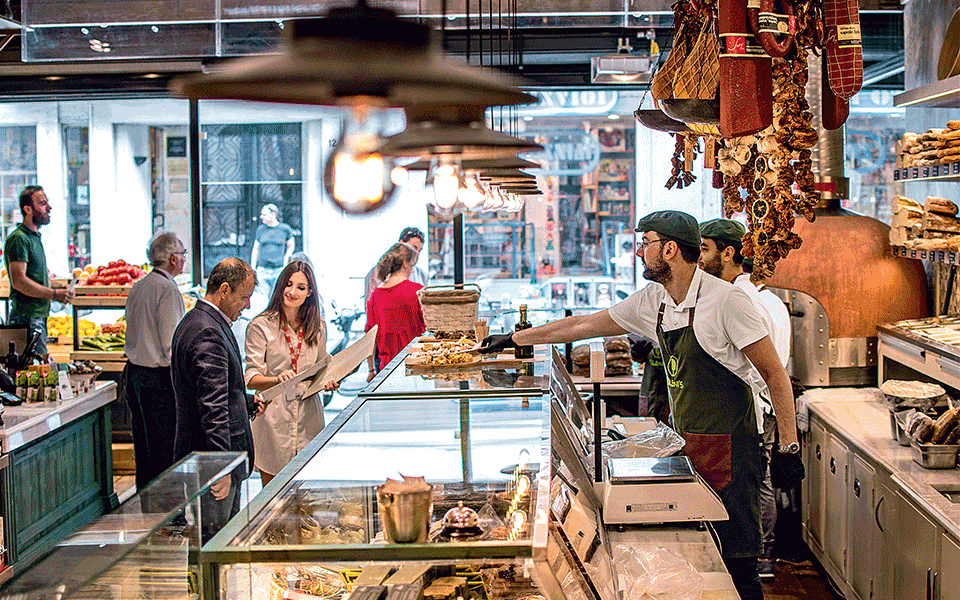In the central indoor food market of Athens, you won’t find stands featuring neatly arranged, Instagrammable exotic fruit from the tropics. The atmosphere inside the listed historic building that houses the Varvakeios Market evokes the Balkans and the Orient rather than Barcelona’s Boqueria or the Marche des Batignolles in Paris. There are throngs of people, strong smells and a great deal of noise.
This is where the freshest seafood available in the city first arrives, and where fishmongers call out prices and clever catchphrases at the top of their lungs in an effort to sell the day’s catch. Make sure you drop by stall number 49, where Arapis will sell you a bag of clams or other shellfish, but you’ll have to take it with you, because Greek law won’t let the fishmongers serve them on the premises.
As for the meat section, avoid wandering in if you aren’t comfortable with the sight of carcasses, since a great deal of the butchery is carried out in the presence of customers.
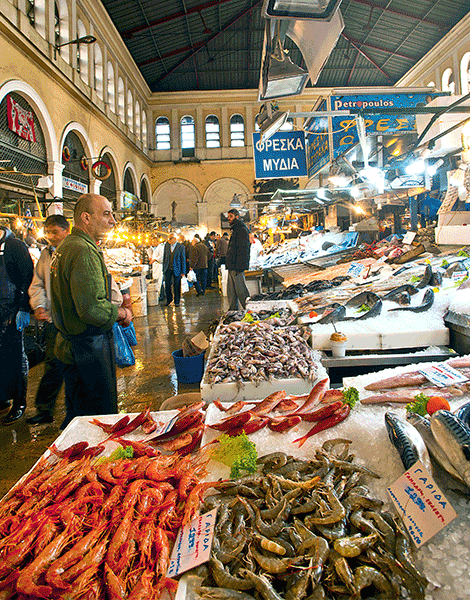
© Clairy Moustafellou
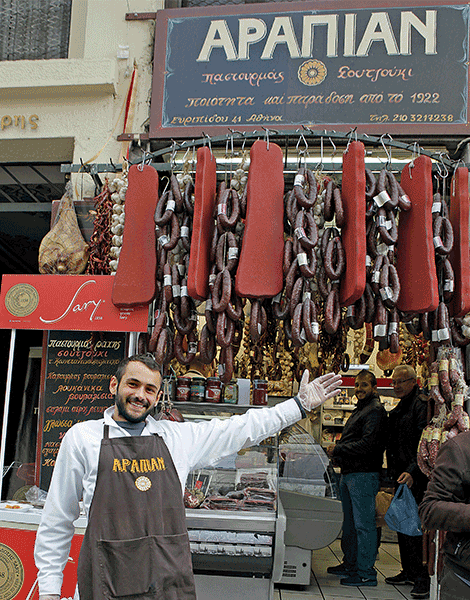
© Katerina Kampiti
The entire neighborhood around this market, both towards Aiolou Street as well as towards Sokratous Street, has the aura of a bygone era. Here, you’ll see people lining up for packs of freshly milled Greek coffee from the city’s oldest coffee roasteries – Mokka and Loumidis. Shoppers dragging their two-wheeled trolleys come to the city center to buy barrel-aged feta and fresh butter from Zafolias’ dairy shop.
As you maneuver down Evripidou towards Sokratous, the bustling crowds brush against the potted plants at the flower shop on the street corner, and the fragrance of spices commingles with the scent of fresh basil. On Evripidou, make sure to pop your head into one of the several old shops that sell mostly in bulk and that have been in operation here for decades. They carry everything from pulses to kitchenware to cleaning products. This street is the city’s own spice route, and you can shop for colorful curry and garam masala powder, as well as for oregano from the Cyclades, smoked paprika from Macedonia, crushed red Florina pepper from the north of Greece, salep flour from Thrace and marjoram from Central Greece.
One shop certainly worth a visit, with a great variety of good quality aromatic herbs and spices and Greek superfoods, is Hatzigeorgiou Bros. Down the same street, you’ll find the little shop called Arapian – a small temple dedicated to select Greek cheeses, cured meats and other delights – which has had a loyal following ever since it opened in 1965.
Across the street, at Karamanlidika tou Fani, Fanis Theodoropoulos has created a modern grocery with dozens of delicacies, mostly charcuterie, but there are also jars of various sauces, mustards, capers and other deli items. You can enjoy a snack from the small tasting menu served on the premises.
At Zouridakis’ Cretan grocery, they’ll treat you to a small glass of raki and a crisp light rusk or to some alatsoelies (small shriveled Cretan olives) before you begin your shopping. Different types of graviera cheese, bite-sized oven-ready pies and snails are all on offer.
The Pantopoleio tis Mesogeiakis Diatrofis (“The Mediterranean Diet Grocery”) was one of the first food stores to bring regional artisanal Greek products to the capital. It maintains direct links with the producers and showcases two or three new products each week; it also organizes food tastings.
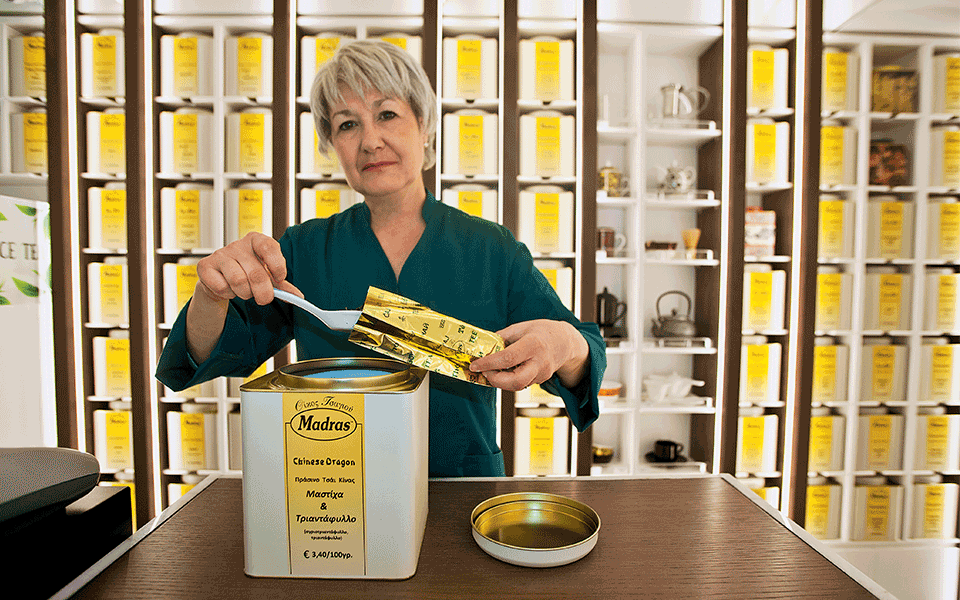
© Clairy Moustafellou
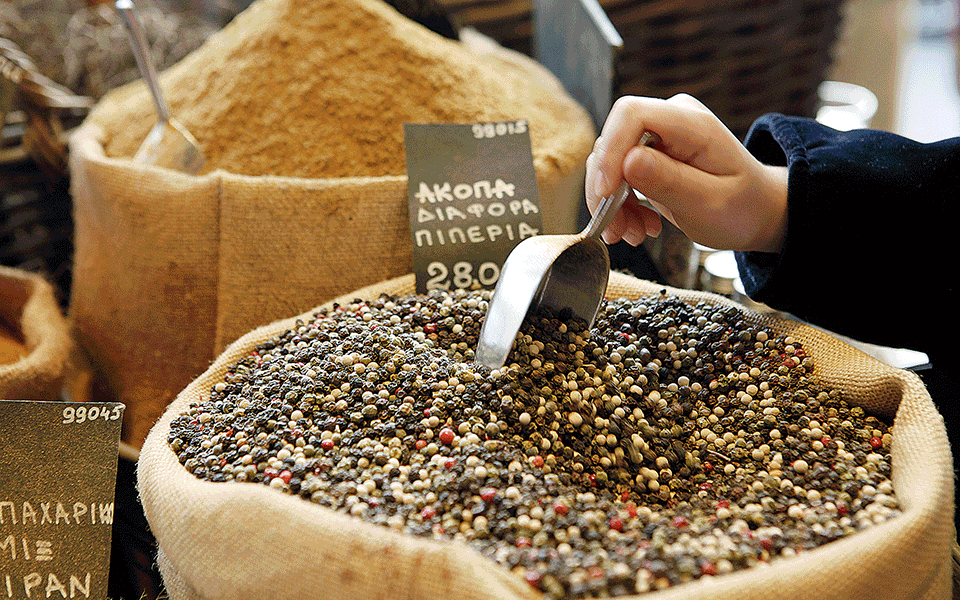
© Katerina Kampiti
As you walk towards Syntagma Square, the bustle and clamor of the market is replaced by modern, shiny new shops lining the streets. In the Bolanis Arcade, Madras is a boutique shop for fine teas, in a pure-white space. You’ll find excellent Greek mountain tea as well as other local aromatic and medicinal herbs with various beneficial properties.
If you follow Voukourestiou Street, you’ll be in upscale Kolonaki in less than six minutes. Yoleni’s is a multistore for foodies. You’ll need plenty of time to explore its two floors filled with regional Greek treasures, including Greek truffles, balsamic vinegar, handmade pasta, fleur de sel from the Peloponnese, and products made using the prized mastic of Chios and the saffron from the northern city of Kozani. Should you forget anything, you can always pick out whatever you want from the website (www.yolenis.gr); the staff will be happy to pack and ship your purchases to wherever you happen to be in the world.
Kostarelos’ deli is a cheese-lover’s heaven, with dairy products of outstanding quality from the family farm, as well as several other noteworthy goods from across the country. Try one of the most delicious Greek yogurts you’ll ever find – their strained goat’s yogurt with just 2 percent fat – which they still make by draining it through a cloth. Buy the soft, slightly sharp feta cheese; you can try it first as a spread in one of the sandwiches that are prepared daily on the premises and served in the shop’s café.

